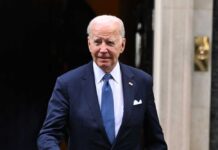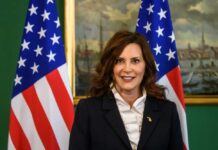
Speaking at the April 20 MEF, or Major Economies Forum on Energy and Climate, President Joe Biden said he would be committing $1 billion to the U.N. global climate fund.
After John Kerry, the U.S. climate envoy, spoke, Biden followed with remarks of his own. He said:
“I’m pleased to announce the United States is going to provide $1 billion to the Green Climate Fund, a fund [that is] critical in ways to help developing nations that can’t do it now.”
The Green Climate Fund was established at a few different climate conferences that the U.N. held. It was created to help some developing countries “limit or reduce their greenhouse gas emissions” and also “adapt to the impacts of climate change.”
To date, the United States has already contributed $1 billion to the fund.
But, Biden said the U.S. would be contributing more. He said:
“We need to strengthen the role of multilateral development banks in fighting [the] climate crisis as well, starting with the World Bank.
Specifically, the president said he was hoping that those financial institutions would expand their lending to climate-related projects and organizations.
In speaking with reporters on a call before Biden made his official remarks at the conference, senior Biden administration officials said that the $1 billion in funding would be taken from what he called “money in hand.” Essentially, that means it won’t be taken out of the fiscal year 2024 budget. That document is currently being scrutinized by Republicans in Congress.
Reporters on the call asked the official exactly what the president would tell other countries regarding a promise he made in 2021 to deliver on $11.4 billion in climate aid on an international basis by 2024.
The official with the White House said the Biden administration is currently considering “new and creative authorities” so that it could find the sources of that funding.
In addition to the $1 billion investment, Biden announced America would be giving $500 million in aid to the Amazon Fund. The Brazilian Development Bank manages that fund.
The president said that money would go toward what he said was “Brazi’s renewed effort to end deforestation by 2030.”
Another $1 billion would be earmarked to efforts of conservation in the Amazon region and Latin America in general, through the Development Finance Corporation.
Biden also proposed a quite ambitious global vehicle emissions target when he spoke on April 20, saying to those in attendance:
“I encourage all of you to join us in our collective goal to ensure that at least 50% of new passenger cars and 30% of trucks will be zero emissions by 2030.”
The senior official in the Biden administration expanded on that when speaking to reporters a day before the president’s comments, saying:
“By 2030, over 50% of LDVs (light-duty vehicles) and at least 30% of medium- and heavy-duty vehicles sold globally will be zero-emission vehicles – so battery-electric, fuel cell, plug-in hybrid vehicles.”














